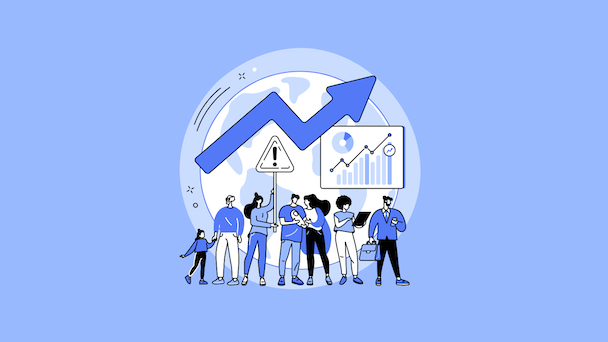Google is driving the digital change that GDPR couldn't
Damon Reeve, CEO of Ozone, reflects on how the adtech scene has drastically changed in the five years since the group’s formation.

Any article about programmatic advertising always repeats two words over and over again: growth and change. The channel prides itself on its chameleon nature, spawning more metrics, acronyms and experts than any other media channel. It confuses most of us, and tech platforms are ahead of everyone else.
Yet, definitive change is now on the horizon. From the beginning of 2024, Google is poised to push us out of the third-party cookie cot and into a new era for programmatic advertising. With their looming demise in Chrome (yes, I’m one of those who thinks the 2024 timetable will be kept), we will also see many of the ad-tech metrics and acronyms that rely so heavily on this cookie data disappear. As we prepare for what comes next, we ask who will flourish and who will falter.
Despite CMA oversight and looming anti-trust cases, I can’t see any scenario where this change won’t favor Google. Beyond that, the future is not so clear, but I do have a particular interest in one group that I will focus on here. Publishers - principally newspaper and magazine publishers - and why they will be central in the next chapter of online display advertising.
Advertisement
For the past five years since Ozone’s inception, I have dedicated most of my waking hours to talking to all corners of the industry about publishing and advertising: what works, what doesn’t, what technologies make it work and those that don’t, and how to thrive in a channel that constantly grows and changes.
When we launched Ozone in 2018, there were five core assumptions we believed anchored the success of our model:
-
Consumers pay more attention to editorial content than other parts of the web.
-
The introduction of GDPR would fundamentally change digital advertising.
-
Timing would be everything - launching Ozone at the same time as GDPR and using it as the catalyst for changing the perceived value of publishers.
-
Collaborating would be critical for introducing sustained change.
-
Investing in our own technology would decouple us from someone else’s product roadmap and interests.
While they were right then, some of these assumptions didn’t play out as we thought. What we didn’t get right was understanding what really drives sustained behavioral change. We thought GDPR would, and we were wrong. Back the,n the market wasn’t interested in changing. And while GDPR was annoying, it wasn’t the forcing function for change we thought it would be.
Advertisement
However, Chrome’s decision to end the third-party cookie is a different kind of catalyst. Change is now coming, and it feels final.
As part of this change, there are three core reasons why I believe publishers will thrive in this new world:
Firstly, because they have to
Good publishers are survivors. They play a crucial role in society - holding the powerful to account and reflecting the thoughts and interests of their readers. They invest in journalists to investigate stories and produce quality editorials that they make available to readers in a fast-changing media environment. The transition from print to digital was fast, and the explosion of social platforms was even faster.
The disruption from generative AI products such as ChatGPT and Bard will come faster again. As digital platforms disintermediated and eroded publishers’ control over their advertising businesses, they diversified from an advertising-led business model into subscription and other audience revenue models to mitigate risk. As print readership declines in the coming years, publishers will continue demonstrating more of this technical innovation.
Secondly, because reader engagement hasn’t changed.
Advertising revenue flows where consumers spend their time. But, consumer time spent and attention are not always consistent. As you know, thumbing through a social feed is very different from reading a long-form article, which matters to advertisers and the memorability of their brand and message. This fact is true whether it’s a news or magazine article in print, on a laptop or phone.
Suggested newsletters for you
In a new programmatic era, premium publishers and their audiences don’t belong in the general classification of ‘online display’ where the currency is the unit price of an impression, and an MPU on The Guardian is valued the same as an MPU on MFA.com that you’ve never heard of before.
Finally, GenAI will transform not only publishing but media planning.
In 2023, generative AI – specifically large language models (LLMs) and accompanying data science capabilities - became a thing. There has been much discussion about how this may impact publishers – for example, if you can get a summary from Bard on the top stories of the day sourced from all the newspapers, why do you need the publisher? Needless to say, many smart people are focused on ensuring the publishing sector retains a differentiated, editorial-led approach from machine-generated content.
However, what is potentially more disruptive is the impact gen AI will have in the planning and buying process. As Chrome deprecates third-party cookies, two things are happening simultaneously. Firstly, less data is available to feed ad-tech attribution models. Secondly, media mix modeling (MMM) – powered by LLMs and data science – is becoming really good, bringing investment in online advertising back into the same planning world as other media channels.
None of this is new to those steeped in this part of the market. Most global brands and agency-holding groups have been investing for a number of years in their own MMM and econometrics capabilities. Anyone exposed to Project Origin can see the direction of travel.
However, there remains one significant hurdle that the publishing sector has to overcome. From a measurement perspective, digital publishers and their media are lumped into the same online channel as the chaff of the long-tail web. Where social display and, more recently, retail media are independently and clearly defined in the media mix, published media is not. And that has to change for publishers and their audiences to be fairly valued in a multi-channel media world.
We believe the premium web represents a new and exciting transformation era for the publishing sector. It will create a real distinction for editorially-led and governed content over machine-generated words, rewarding the journalistic oversight that holds the powerful to account. It will place greater value on the higher levels of engagement that original content delivers, which, thanks to the evolution of media planning tools and platforms, will ensure brand investment flows and grows into the newly defined channel.
Change is afoot. While in the short-term, GDPR first time round didn’t herald a shift in fortune for publishing, its long-term impact on Google’s response to privacy concerns will bring sustained behavioral change that is well overdue, enabling the premium web to thrive.
